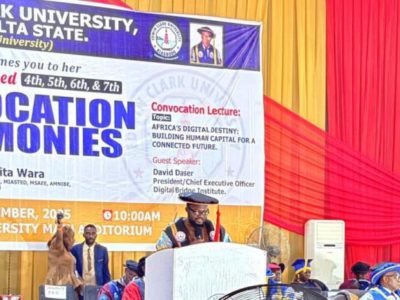Matters eRising with Olusegun Oruame
Depending on how you see it, Change: one of the cardinal hymnal themes of the President Buhari’s administration may have finally happened at the Ministry of Communications and Digital Economy. Until months back, the ministry was simply called Ministry of Communications. It hovered around slothfully under former minister Adebayo Shittu as one of the most uncreative ministries in the first four years of the APC federal government (2015-2019).
But that has changed. In less than three months, the ministry under a new Sheriff got approval of the federal government for a re-christening to reflect an industry perpetually in transition and over which the ministry has oversight roles. The ministry has become more proactive in engaging and making statutory pronouncements on some of the thorny issues as they concern consumers, operators and regulators.
In the last two or three months, no week has passed without the minister’s office asserting government’s position on several issues across the sub-sectors that fall within the purview of the ministerial oversight of the Ministry of Communications and Digital Economy. Every such intervention or pronouncement has ignited both controversies and reactions of all stakeholders.
It has been a long time since the ministry had a minister who came to office with a sense of leadership that is inherently value-based and is concerned with fostering change.
But you must have a good grasp of Dr Isa Ali Ibrahim Pantami, Buhari’s Minister of Communications and Digital Economy, to appreciate why change could happen to that ministry. He is the Sheriff calling the shots at the ministry you now know as Ministry of Communications and Digital Economy.
“It has been a long time since the ministry had a minister who came to office with a sense of leadership that is inherently value-based and is concerned with fostering change.”
Not many Nigerians were conversant with the roles of that ministry but since Pantami assumed office, now you have a growing multitude of enthusiastic voices able to connect their stake in the telecom or postal sector and the responsibilities of the ministry to them as stakeholders.
You have heard of how the ministry stopped telecom network operators from imposing a N4 charge on subscribers for Unstructured Supplementary Service Data (USSD) access to banking services.
You are now conversant with how millions of Nigerians reacted and the controversies that broke upon the financial and telecom sectors.
You know of the ministry’s order to the Nigerian Communications Commission (NCC) to compel telcos to reduce the prices of their data packages. You also know of the additional directive to the NCC to put an end to frequent data depletion experienced by subscribers.
Of course, you must be following the endless reactions these orders have generated in the telecom sector where it once appeared subscribers were preys to ceaselessly feed the olfactory taste of mobile network operators (MNOs) in a way that reminds you of that ageless poem of Aimee Cesaire: ‘The whiteman is a tiger to my throat’. Incidentally, I had written a piece ‘Telecom operators are a tiger to our throats,’ almost a decade back.
You already know of the order making it mandatory to only transact at all NIPOST centres across the country via cashless means. Cash transactions often ending in the side pockets of unscrupulous NIPOST officials are now illegal.
Then, only last week, you heard of the ministry’s declaration of the federal government’s position to governors that telecom facilities are critical national infrastructure (CNI) deserving protection by governments of the 36 states that make up the federation.
“Pantami said he believes an appointment into an office is a privilege that obligates on the appointee the necessity to ensure that an office makes an impact and drive positive change in accordance with the mandate of that office.”
Not many people may be conversant with issues as they concern CNI in some of the states. For over a decade now, the telecom sector has been faced with issues of multiple taxations and levies imposed on MNOs by revenue and environmental agencies in many states across Nigeria. These levies are often illegal and undermine both the national laws that set telecom facilities apart as CNI and the jurisdiction of the federal government itself.
When MNOs fail to pay, they are forcibly shut down and in some cases, their facilities vandalised by officials of these states’ agencies. MNOs have, on several occasions, asked for the presidency and National Assembly to intervene but there has been no respite until now.
The statement by the Ministry of Communications and Digital Economy would appear to be the first time the federal government is opting to adopt a more aggressive approach at protecting MNOs from excesses of agencies in those states.
The ministry did not mince words that it meant business in its official statement released in Abuja last week. The language of the statement is tough, firm and carries some degrees of adamancy.
Consider excerpts of the statement below:
“The office of the Honourable Minister has received several complaints from Mobile Network Operators (MNOs) about the unfortunate incidences of forced closures or outright destruction of telecommunications infrastructure in some parts of the country.
“Also, these actions constitute a violation of relevant laws of Nigeria and are a threat to national economic development as most businesses nowadays, depend on services provided by telecommunications operators.
“In line with the provisions of the Cybercrime Act of 2015, Telecommunications Infrastructures are designated CNI and therefore, any acts of vandalism or deliberate obstruction of service delivery is deemed unlawful and punishable by law.
“All governors, whose states are affected by this scourge, are respectfully reminded and encouraged, to immediately deploy strategies that will bring an end to it. As Chief Security Officers (CSOs) of their various states, they are to ensure the immediate implementation of, and compliance with this directive and anyone who persists with this criminal act brought to book in accordance with the law,” added the statement.”
On assumption of office as a minister of the federal republic, Pantami has not pretended about his desire to drive change and to step on toes, if need be. He already has a reputation for doing so in NITDA where he was the director general before his current appointment.
While at NITDA, Pantami had drawn many ministries, departments and agencies (MDAs) into accepting NITDA’s strategic and statutory role in overseeing IT public procurement process for all MDAs to save cost. He had pursued an aggressive agenda for public sector inclusiveness to ensure a sustainable and transparent process in IT deployment that would ensure that the MDAs adhere to global best practices for IT usage and integration.
To achieve this, Pantami led the NITDA to forge alliances with key government agencies including: the office of the Auditor General of the Federation (AGF) and the Economic and Financial Crime Commission (EFCC) meaning that that any MDA that embarked on an IT project without NITDA’s clearance would be issued audit query by the office of the AGF and could face criminal prosecution by the EFCC.
“Pantami has not pretended about his desire to drive change and to step on toes, if need be. He already has a reputation for doing so in NITDA where he was the director general before his current appointment.”
No one had asserted NITDA’s mandate before this and no one had sought to bring sanity to the IT procurement process in the MDAs before now. Before he left the government IT agency, the fear of NITDA had become the beginning of wisdom for many of the MDAs. By the end of 2018, the NITDA could lay unchallenged claim to saving government about N3 billion through IT clearance process and helping to tame decades of corrupt practices at the MDAs already associated with abuse of IT procurement processes.
Before NITDA’s insistence on IT projects clearance, public sector IT projects were notoriously associated with siphoning of public funds while auditing of IT projects was often not in accordance with the statutes, significantly costing the country billions of dollars. But that stopped when Pantami leveraged NITDA’s mandate and started on his IT procurement process for the MDAs.
In one of the several interactions this writer had with him, Pantami said he believes an appointment into an office is a privilege that obligates on the appointee the necessity to ensure that an office makes an impact and drive positive change in accordance with the mandate of that office. Pantami lives his words. Not surprisingly therefore, his first meeting on assumption of office as a minister with heads of agencies under his ministry was to set targets for the Chief Executive Officers (CEOs) of those agencies.
Will Pantami get his vision right at the ministry of communications and digital economy? It is likely he will – his record at NITDA in less than three years speaks volumes. Like Abraham Lincoln whose driving philosophy was ‘powerful persistence,’ the Sheriff at the ministry has a knack to evolve strategies to hit the bull’s eye.
“ICT contribution to the country’s Gross Domestic Product (GDP) stood at 13.85 percent in the second quarter of 2019. The change of nomenclature will propel the ministry to reposition its strategic objectives as laid out in the priority areas of this administration while accelerating growth and social inclusion,” Pantami told an audience just after the ministry was renamed.
Since then he has persisted in reworking how the ministry engages issues with an eye on evolving strategies to explore the thematic value propositions in Nigeria’s growing digital economy that could tap from the $11.5 trillion global digital economy fund. Small wonder, this year’s eNigeria, the annual flagship conference and expo of NITDA, is focusing on how Nigeria’s fledgling digital economy could get a boost. Pantami has said his vision is to help reposition Nigeria to become the leading digital economy in Africa, time is not what he has but that obstinate persistence to make his vision for Nigeria come true.





























